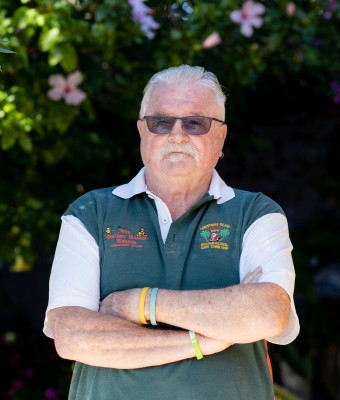Paul McCallum
Thirty years ago in 1991, Paul ‘Maca’ McCallum first set foot on Christmas Island.
Born in the North East of England, Paul was a rigger by trade at the time and had been contracted to manage the rigging works on the construction of the Island’s new casino resort.
“I won the contract to erect all of the structural steel and the precast concrete units on the project. I did the job with two mates, a vast change from my previous contracts on the Burrup, the North West Shelf, where I had over a 100-crew working for me up there. They were all riggers, scaffolders and crane operators,” he says.
“Coming to Christmas Island was a dream job, I loved the remoteness and the climate.”
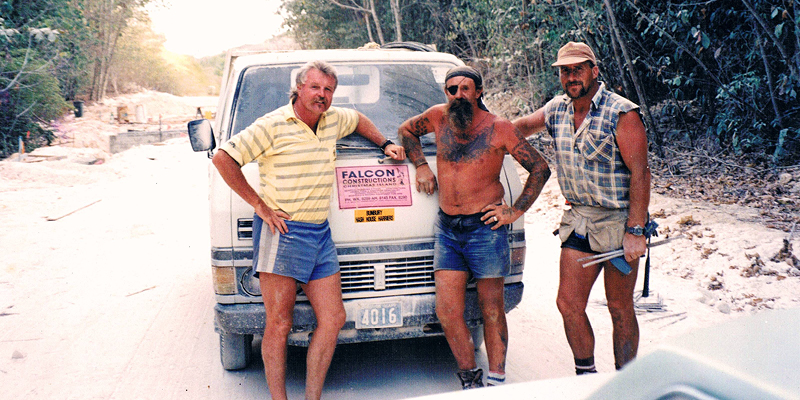
Paul, known to everyone on the Island as Maca, rapidly won the hearts of locals.
“I loved the community there, also the cultural diversity. I could visit the Catholic church, the Muslim mosque and a Buddhist temple all in one day,” he says.
“Because I'd travelled and played rugby in Asia, I got on extremely well with the Chinese people on Christmas Island. I had an affinity with them straight away. So that made it easy. It was the same with the Malays. I just got on great with them all.”
Maca had come over from Western Australia but was no stranger to travelling. He says he had been all over the world before landing on Christmas Island.
“I came to Australia in 1968 on the Big Brother scheme when I was only 18 and stayed two years. I worked up in the Pilbara, the north-west of WA. It was wild, like the wild west,” he says.
“But after two years, me and me mate jumped on a ship on a one-way ticket from Fremantle and got off in Panama City. We spent the next five and a half months traveling through Central America, Costa Rica, Guatemala and Honduras, to a lot of places that many people can’t travel to these days.
“Since then, I've been all over the world many times. I've done all of Europe, travelled South America, the Amazon, Afghanistan, everywhere, you name it.”
Maca says when he finally arrived on Christmas Island, he just knew it was a special place.
“At the time, the mine had been closed for about four years and there were no houses, so we were living in dongas at the casino construction camp at Tamman Sweetland, Poon Saan.
Poon Saan is the second-largest town on the Island. In Cantonese it means ‘halfway up the hill’.
“We lived there for about four months, the amount of time it took us to complete our job on the casino resort.”
It was about this time, the Commonwealth Government was commencing the Christmas Island Rebuilding Program and with Maca’s extensive construction experience, he was asked to join the recently formed local Chamber of Commerce and Industry (CCI).
At one of the first meetings, he bumped into an old rugby mate, who he played against in Western Australia, who just so happened to be Warren Snowdon the then-Federal Minister for Territories.
“He walked in and said, ‘Bloody hell – Maca, what are you doing here?’ Of course, everybody turned around and looked at me. I had a bit of long hair, and the earring, and all that. They looked at me and they laughed and used Warren’s same words., ‘Bloody hell, he knows the minister’”, Maca laughs as he recounts the story.
Knowing the Minister for Territories personally gave Maca a direct line to the Federal Government in his position at the CCI.
“Because there was no housing, there was nowhere to live as we had to give up our rooms in the dongas at the Tamman Sweetland construction camp to the next bunch of casino workers that came in. There was nothing on the Island to rent, and I said to Warren, there are these units, they are empty and have been abandoned now for several years. How about, tell me straight, can we stay there? If we clean them up?"
Maca and his two friends, John Short and Rick Jannse, were granted permission to live in the housing complex known as the Roundabout Units. They, like many buildings on the Island at the time, were now derelict. They had been the Asian Clerks Quarters and built by British Phosphate Company, decades earlier, well before the mine shut down in the late 80s, meaning the Federal Government had jurisdiction over them.
“There was no electricity, no water, open drains and squat toilets. Inside there were plenty of rats and dead crabs, a wee few white ants and lots of phosphate dust. Mr Yew, The owner of Yew’s Coffee shop, where Yew Tree Lodge is now, at the far end of the Roundabout Units, let us run an electric lead out of his place so at least we had power and it was liveable,” he says.
“We lived there for four months, downstairs, three of us in one of the units. We just used to cook outside under a big tree, on a 44-gallon drum BBQ.”
That type of housing was usually about $150 a week, however, Maca managed to make a deal with Minister Snowden to fix up the units in kind.
“The deal was, if you put the water on and jack-hammered out the squat toilets and put new toilets in and fixed the electrics, you could stay there,” he says.
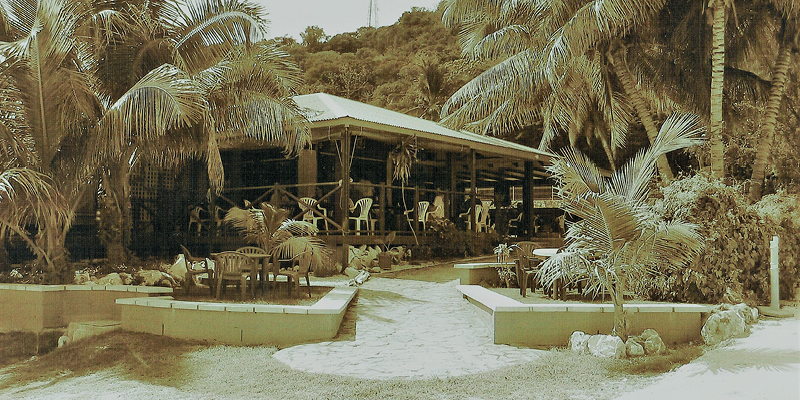
“The rats and dead crabs moved out and we found other people who wanted to stay and work on the Rebuilding Program and eventually we had enough takers for all eight units and so rescued them. Later we all formed a body corporate and bought them.
“It was a credit to all concerned, true Christmas Island community spirit.”
Once the mine reopened on Christmas Island, the economy began to bounce back and Maca stuck around to work on various demolition contracts, and other upgrade work on the old and storm damaged admin buildings, the wharf and marine works, and the power station.
He became quite the local hero after being instrumental in refurbishing the Poon Saan cinema in 1993.
“At the time, the cinema was totally derelict. It hadn't worked for years, since the big storm of 1986. The screen had blown down and there was a jungle growing right through all of where the seats were and they were all cracked and busted,” he says.
Maca, whose family had now moved over to the Island, got together his sons, Mick and Jake, and a group of young rugby players from his old club in Perth to help fix up the cinema.
“I was a Christmas Island Shire Councillor back then, and I got on great with the then CEO, Jeff Glass. Together we requested a grant via the Casino Community Benefit Levy Fund, to refurbish and reopen the cinema,” he recalls.
“But there was one problem. A little Chinese fella called Sookie Beng, had built a temple in the projector room and where the kiosk is now, that was where the altar and the gods and incense were.”
Maca decided to make a second application to build a new temple, so that they could move Sookie Beng’s temple so that we could access the projector room.
“We had to get a grant to build the temple so we could reopen the cinema. So within about six to eight months, we had refurbished and had the outdoor cinema operating again, and we had built a new temple. The older Chinese guys call that Maca's temple,” he says.
Maca also brought to the Island its first tavern style pub, The Golden Bosun.
“Before that the Island had Bubbles, a famous nightclub and the CI Club. Back then there was no real liquor licensing control such as we have today. The regulations were lax and you could go to the Boat Club, Golf Club, even the Rumah Tingi bar, virtually any time day or night and grab a beer or whatever and just sign for it. It was all about respecting the place and the community ‘Honour System’,” Maca explains.
“Bubbles was your classic, retro nightclub; with the mirror ball on the ceiling, and the little flashing Chinese lights all around the walls. Huge red velvet lounges and armchairs and bar stools and furnishings left over from colonial days. Bubbles was the place to be from midnight to dawn on a Friday night.”
When that was demolished, Maca turned his attention to another set of 11 buildings, located in an area known as the Barracks in 1993.
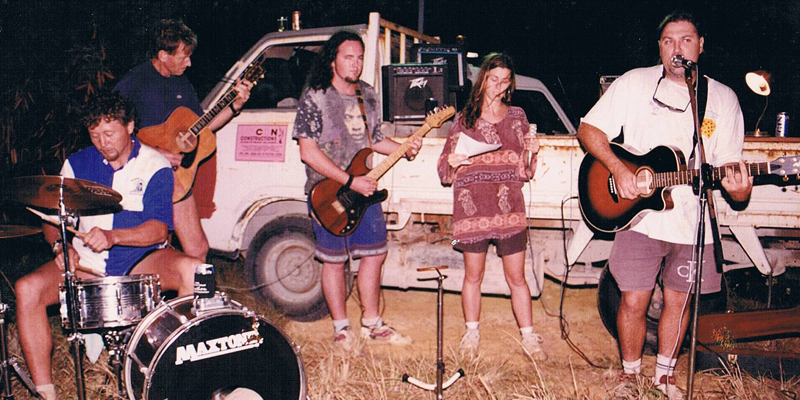
Just like the Roundabout Units, the buildings were in a bad state and overgrown with jungle, but he once again saw potential.
“I was on island for nearly eight months, and I never even knew there were buildings there. The acacia and tropical vines and weeds had grown to the verge of Gaze Road. There was only a track that led one way to the back of the old hospital and the other to the front of the Police Station. I got onto Warren again and advised him that the buildings were solid, and it would be criminal to demolish them.” Maca says.
“We set it up like the Roundabout Units and got others to live there. Indian Ocean Dive Academy, Shorefire, Soong’s Car Rental, Annie’s Kitchen and Gold & Things. They all set up shop there and at the time was the main shopping area on the island. My wife Celia opened up The Robber Crab shop at the front of our house. My brother, John and I took the end two buildings. We had decided to convert them into a tavern, The Golden Bosun.”
Maca says he and his brother built the pub from scratch.
“We got a lot of the old timbers and beams, from the wharf and the storerooms and the workshops that we had demolished. There was some beautiful big old timber among that lot,” he remembers.
The tavern was opened in 1996, a time when about 350 staff worked at the casino resort. Australian liquor license laws meant the staff could not remain on the casino premises after they finished work, so the tavern was where they would go.
“Tuesday night was the Bosun’s biggest night, so we’d have jam sessions. John, and I would go along to the casino and poach two or three members of their band, because they used to have a band come and play once a month from places such as Singapore, The Philippines and Melbourne.
“We’d offer them a free feed and a few beers, and they would jam with the locals all night,” he says.
It became the main event on the Island, and there had plenty of jam night sessions at the Bosun with crowds of more than 200.
The only thing missing, Maca says, was the incredible Christmas Island sunset. That dilemma prompted him to then purchase the old nurses’ quarters when they came up for auction and move the Bosun across to that side of the track to allow for a restaurant and deck and to be able to watch the sun go down over the ocean.
The Bosun’s mantra soon became ‘365 Sunsets a Year’.
Maca later sold The Golden Bosun, which now remains in the same location.
He says there was never a dull moment during his time on Christmas Island and recalls one traumatic experience where he witnessed a boat of asylum seekers crash into rocks.
“We were around the back of the casino lagoon, which had just opened. We had a night diving crew called ‘The Smart Team’. We had been hunting crays along the wall towards Lily Beach. It was about 8pm and out of nowhere this great big fishing boat with 65 Vietnamese asylum seekers arrived,” he says.
“We could see this searchlight flashing along the lagoon rock groyne, and we thought it was some of the Malay boys catching Flying Fish. It wasn’t! This boat just steamed into the entrance of the lagoon. We were all waving our torches, still in wet suits and carrying the crayfish, waving our arms, and screaming to them, and shouting, ‘Na, na, na’. It was crazy.
“It was like something out of a movie. You couldn't believe it was happening. Johnny Mather drove up to the Casino to raise the alarm, and ran into the main entrance, full of customers and guests. He was still in his wetsuit. Don, the resort concierge, thought it was a Hash House Harriers prank.”
Maca says the asylum seekers were Christians escaping from the Communists in Vietnam.
“We spent the rest of that night getting them off the wrecked boat, carrying them out of the waves and danger and putting them into our little dinghy. The cops turned up with two of Bob McKnight’s buses and they all went off for a nice warm and dry night in the old sports hall. There were lots of women and children. Thankfully they all survived but it could have been a disaster,” he says.
Maca says he stayed on the island until 1996, with his wife running a small shop called the Robber Crab.
“I stayed because I loved the lifestyle,” he says.
By 1996, the casino was on the wane, less flights and overseas visitors and there wasn’t enough work for Maca to thrive, so he took a job in The Philippines.
While over there he coincidently worked alongside other expats who worked for the company who just so happened to win the contract to build the detention centre on Christmas Island four years later.
This brought him back to the island in the early 2000s to work on its construction but by 2008 he decided to move back to Perth to spend more time with his grandchildren.
Maca still owns his house on the Island, at the Barracks, with it’s huge back deck, built on old beer kegs and with the mandatory 365 sunsets a year.
He visits several times a year for a month or so at a time.
Since he retired five or so years ago, he has totally renovated his place, though it still has the Maca style.
“My kids call it ‘The Barnacle’ – after me,” he laughs.
“I like to write and draw and do my quiet projects, but I can’t stay away from the adventure, outdoor stuff.
“Of course, everyone on island knows I am one of them crazy CI ‘Hash House Harriers’ that goes off running through the jungle every Thursday night. But after more than 500 runs on island, you get to know and feel the rainforest and the place pretty well. It’s beautiful and dangerous at the same time.
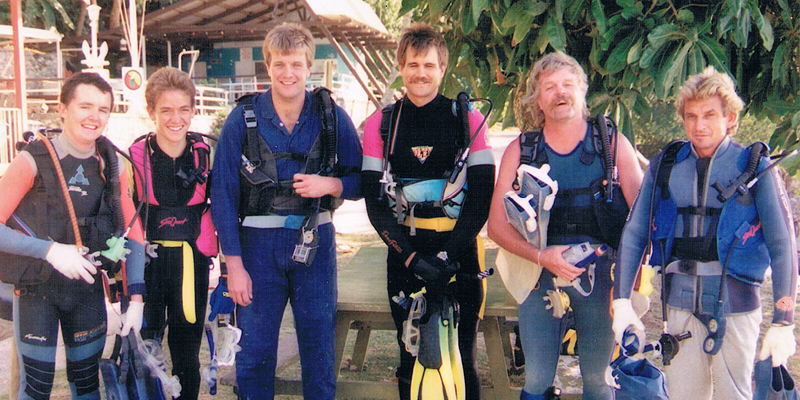
“I love the jungle. Sometimes I go out there by myself with me swag and sleep up near South Point.
“I also love the diving and the caving, its magical.”
But Maca says the people are what make Christmas Island special to him.
“It’s the community that I love the most. The Island has the best school in the world,” he says.
“It’s great to be able to go up to the cricket club and watching the young ones play. The teams often have two or three girls in each team. When you see the Malay girls and the Chinese girls playing cricket, you think, wow, how good is this.”
Maca believes the Island’s economic future lies in eco-tourism.
“Christmas Island is just raw tourism. I believe you’ve got to make it what you want. It's not going to be a Bali. It's not going to have regular hire cars, regular buses, and all this. You've got to go there because it is different,” he says.
“The bird watching, the camping, the wildlife, caves, the diving and fishing is what will bring people to this Island.
“But government departments and the local council and authorities all need to work more together to make this happen and to see this move forward.
“If the Island is to succeed, then a few of the decades long setbacks to progress need to be addressed. Airfare prices are exorbitant – residents should have access to Apex fares. Freight and Mail issues are huge. A concerted effort by all parties needs to be achieved to develop an updated and meaningful perspective and implement the upgrades accordingly.”
Maca says of all the places he has visited in the world; Christmas Island will forever hold a special place in his heart, and he looks forward to making many more memories there.


